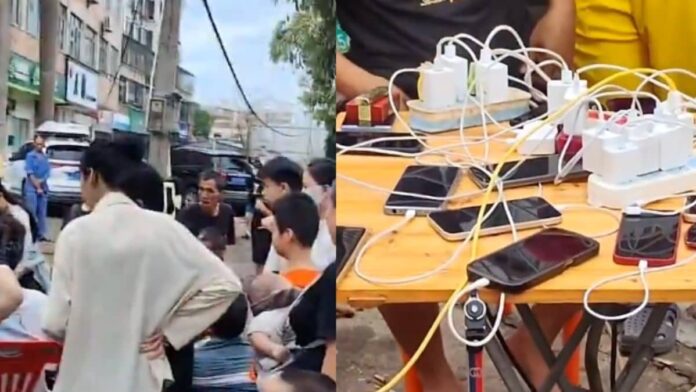Last Updated:

Struggles of Chinese residents post-typhoon Yagi. (Photo Credit: X)
In 2024, Yagi ranks as the most severe tropical cyclone in the Pacific, and the second most violent tropical storm, behind Category 5 Atlantic Hurricane Beryl.
Yagi, the strongest storm of the year in Asia, made landfall in China’s Hainan province on September 6, bringing heavy rainfall and wind speeds of 234 kilometres per hour. The super typhoon caused blackouts, leading to hardships for residents in the aftermath. Now, an X thread is making headlines exposing the “Downside of a cashless society.” In a video shared by a user, residents are shown charging their mobile phones at a makeshift station in a densely packed space. It seems the vendor was using an engine for the power source.
The caption read, “After the typhoon, the water and electricity were cut off. Chinese people desperately want to charge their phones as all their money is in their mobile phones. Without a mobile phone, you can’t even buy a piece of bread.”
Downside of cashless societyHainan, China🇨🇳After the typhoon, the water and electricity were cut off, Chinese people desperately wanted to charge their phones.Because all your money is in your mobile phone. Without a mobile phone, you can’t even buy a piece of bread. https://t.co/EfluhEUilv pic.twitter.com/IYEGEnW0Tr
— Songpinganq (@songpinganq) September 9, 2024
Another video demonstrated the drawbacks of electric vehicles, showing people stranded and running to charging stations to top off their batteries.
Downside of electric carsHainan, China 🇨🇳After typhoon, Chinese people desperately want to recharge their electric cars in remaining charging stations.So they can charge their phones.
Because all their money is in their phone. They now can’t even buy a piece of bread. pic.twitter.com/Oqw3r3r84V
— Songpinganq (@songpinganq) September 9, 2024
It also states that recharging an electric car is restricted to users of WeChat, China’s digital wallet, whose social credit score is 550 or above.
Now, China’s Digital Wallet WeChat only allows people with a social credit score of 550 or higher to recharge their electric cars.CBDCs are most likely to serve the interests of governments by increasing financial surveillance, decreasing financial freedom, and expanding the… pic.twitter.com/N61Mv0fOqV
— Songpinganq (@songpinganq) September 9, 2024
It was also mentioned that digital currency in China has “expiration dates” incorporated in it. This implies that if the currency is not used within a specific period, it will expire. Additionally, if your account or digital wallet is frozen by the social credit system, you will not be able to use your digital currency.
China’s digital currency is programmed with expiration dates, which means the currency will expire if not used in a certain timeframe.If you are blacklisted by social credit system, they freeze your bank account and digital wallet..so you can’t spend your own digital money. pic.twitter.com/TCzcLbJyjP
— Songpinganq (@songpinganq) September 10, 2024
It added that you were not permitted to use the digital money WeChat for payments during COVID-19 if your vaccination passport expired which is when the code in your Covid app becomes red.
During Covid, in China, if your vaccine passport expired (the code in your Covid app turns to red), you were not allowed to pay with digital wallet WeChat.When you pass checkpoint with red code, immediately an alarm goes off..then you would be sent off to a quarantine camp. pic.twitter.com/1uEN7JYaWu
— Songpinganq (@songpinganq) September 10, 2024
It further mentioned that during COVID-19, China’s digital wallet WeChat or Alipay prevented you from using your digital money if your vaccination passport expires since WeChat functions as China’s contact tracing and vaccine passport app.
Downside of cashless societyDuring Covid, if your vaccine passport expires, China’s digital wallet WeChat (or Alipay) doesn’t allow you to spend your own digital money.
Because the digital wallet WeChat is also China’s contact tracing app as well as vaccine passport app. pic.twitter.com/jh8Lp3aO7j
— Songpinganq (@songpinganq) September 10, 2024
According to the thread, the country established “quarantine camps,” which were “literally concentration camps,” to imprison anyone who refused to receive vaccinations.
@CNN refused to call China’s quarantine facilities as quarantine camps.They are literally concentration camps for locking up people who refuse to get vaccinated.
I was forced to get vaccinated in this quarantine camp. pic.twitter.com/ALgQ13wZAQ
— Songpinganq (@songpinganq) September 10, 2024
A user commented, “Now, imagine the Internet goes down for an extended period.”
Now imagine the Internet goes down for an extended period— Escher Nineeleven (@Escher911) September 9, 2024
Another said, “Maybe going cashless isn’t a good idea after all.”
Maybe going cashless isn’t such a good idea after all— George Saoulidis ⚡ (@saoulidisg) September 10, 2024
Another user added, “Well, if your cash is in the bank, and the cash machine has no electricity you are not much better off.”
Well, if your cash is in the bank, and the cash machine has no electricity you are not much better off— Sifossifoco (@Sifossifoco1) September 10, 2024
“They could at least charge phones but we couldn’t charge the ATM,” a comment read.
They could at least charge phones but we couldn’t charge the ATM.— Annabelle Jones (@annabel98_jones) September 10, 2024
In 2024, Yagi ranks as the most severe tropical cyclone in the Pacific, and the second most violent tropical storm, behind Category 5 Atlantic Hurricane Beryl. According to state news agency Xinhua, at least 419,367 inhabitants were relocated before Yagi.
Read More: In China, Typhoon Yagi Exposes Risks In Cashless Payment System Amid Power Outages – News18


